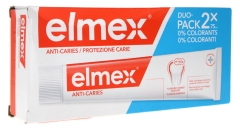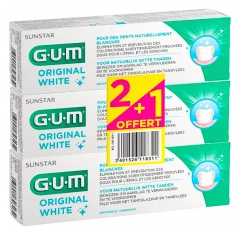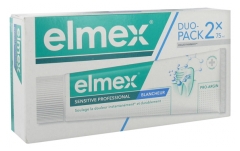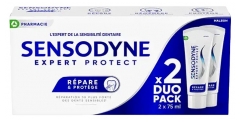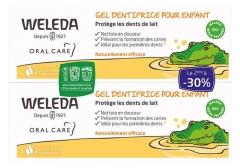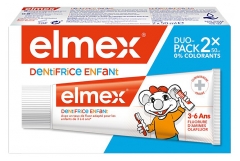Choosing the right toothpaste:
a solution for each issue
Written by Paul Musset, Doctor in Pharmacy | published on | updated on 15/04/2024

When it comes to toothpaste, there is such a wide range available, that it is sometimes difficult to choose one. However, each toothpaste has very specific characteristics and making the wrong choice can deprive you of real benefits for your teeth. So what is the best toothpaste – the one that is best suited to each age and situation?
Anti-plaque and anti-cavity toothpaste
We often hear about tartar and dental plaque, but what exactly are they? When we eat, a multitude of food particles remain in our mouths, especially sugar. Some of these particles are transformed into acids and mix with protein in our saliva, bad bacteria and the resulting toxins, settling on our teeth as a white coating.
This plaque is a real scourge for teeth, since acid and bacteria attack the enamel and cause cavities and even more painful infections such as abscesses. If you do not brush your teeth properly, this coating gradually mineralizes and hardens, forming tartar that irritates the gums at the cementoenamel junction. This can then lead to the teeth becoming yellow and loose.
Anti-plaque toothpaste does not remove tartar that has already formed; a dentist’s instrument is the only solution for that! On the other hand, the formation of tartar reduces the adherence of bacterial plaque, thus limiting its adhesion to the teeth. Anti-cavity toothpaste often contains fluoride, which helps remineralise the enamel and makes it stronger.
Fluoride, friend or enemy?
Fluoride is a mineral that attaches itself to the structure of the enamel and makes it more resistant to cavities. At very low doses, it is therefore an oral health ally. But the recommended dose should never be exceeded. In the event of overdose, fluoride causes “fluorosis”. This condition appears as small white spots on the teeth; but at a more serious level, it can cause them to crumble. Therefore, it is important to choose the right toothpaste for each age. From 0 to 3 years old, no toothpaste at all. From 3 to 6 years old, toothpaste containing less than 500 ppm (parts per million) fluoride. From 7 to 12 years old, between 500 and 1,000 ppm; and for adults, 1,500 ppm maximum.
Whitening toothpaste
Not all of us have the same bright white smile! Tooth colour varies greatly from one individual to another. In addition, certain habits contribute to causing the enamel to become stained yellow: tobacco in particular, but also tea and coffee.
Only special treatment from a dentist will really whiten your teeth. However, some toothpastes can help make your smile look brighter. Some of them contain microgranular sodium bicarbonate, which has an abrasive effect that helps remove discolouration due to beverages, for example. It is better to use these toothpastes than to sprinkle your toothbrush with pure bicarbonate, which is too abrasive and would weaken the enamel. Other toothpastes have a whitening effect due to a bleaching agent that settles on the teeth to give an impression of whiteness, or that brightens the colour of the gums to make the teeth appear whiter in contrast.
Toothpaste for bad breath
One in two people has already experienced either occasional or long-term bad breath problems, also known as halitosis. Bad breath can come from digestive diseases, dental, gum or oral infections, or a dry mouth due to a lack of salivation. Smoking is also a well-known cause of bad breath. In the absence of these causes, most cases are simply the result of poor oral hygiene. Bacteria proliferate and release unpleasant smelling sulphur compounds.
The first thing to do is to brush your teeth better! However, some toothpastes can improve the situation with their fresh minty scent, antiseptic agents, or salivation-promoting ingredients.
Toothpaste for sensitive teeth
Sensitivity to cold and heat often results from the beginning of a loose tooth, as this leads to the exposure of part of the root made of dentin, which is more porous than enamel. This means that the nerves located in the pulp of the tooth are accessible to the cold and heat. Toothpastes that treat tooth sensitivity are designed to fill small holes in the dentin with minerals. If that is not enough, a dentist can apply a hardening gel to the cementoenamel junction of sensitive teeth.
What about children?
While many adults appreciate minty flavours that procure a sensation of cleanliness and freshness, this is not the case for children, who are often discouraged by these slightly spicy flavours. So manufacturers have developed many toothpastes for children with a variety of flavours, ranging from strawberry to chewing gum, in small tubes with fun or practical shapes (like pump dispensers).
Be careful with the quantity: children under the age of three do not need toothpaste, especially since they do not know how to spit it out properly. Brushing must be done by an adult. Beyond this age, a pea-sized amount is enough. Children can then start learning to brush their own teeth, but under adult supervision so they learn the proper technique and do it for at least the requisite two minutes!
You don’t have to use the same toothpaste your whole life long. Depending on your current needs, you should choose the best toothpaste for you, the one that provides the benefits you need! At Cocooncenter, you will find a wide range of high-quality toothpastes, organic or non-organic, with natural ingredients, with or without fluoride, for adults and for children.
When choosing your toothpaste, remember these three key points:
- Tooth colour, enamel strength, saliva properties: We do not all have the same propensity for dental problems. Each person must find the toothpaste that best suits them.
- It is possible to get much whiter teeth thanks to a special treatment from a dentist. Some toothpastes can reduce yellowing, but avoid products that are too abrasive.
- Be careful with the fluoride dosage according to age and other dietary intakes.




